Annie Perkins, Senior Director, Green Building and Supply Chain
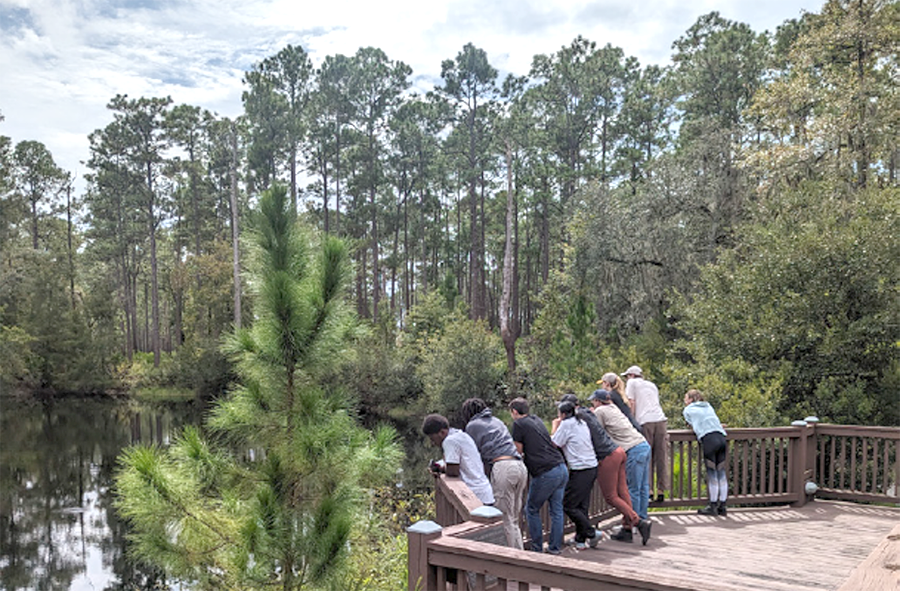
Recognizing and Addressing Knowledge Gaps in the Architecture Industry
The building and construction sector is responsible for nearly 40% of global carbon emissions, yet many architecture students graduate without a full understanding of the environmental impacts of construction materials. Because of this, architecture graduates enter the workforce and may find themselves gravitating toward certain construction materials without considering their environmental implications. While the ecological impact of construction materials is not always immediately apparent, architects must be aware, informed, and able to make responsible choices in building design.
From sourcing to manufacturing, wood-based building products offer a unique opportunity to reduce a building’s carbon footprint—especially when sourced from responsibly managed forests. As a leader in sustainable forestry, the Sustainable Forestry Initiative (SFI) plays a key role in supporting architects, designers, and builders in making informed material choices. Through the SFI Chain-of-Custody and Certified Sourcing standards, SFI-certified wood products are traced through the supply chain, providing confidence in their sourcing and sustainability. Additionally, SFI-certified materials contribute to LEED and other green building certifications, making them an essential part of climate smart construction.
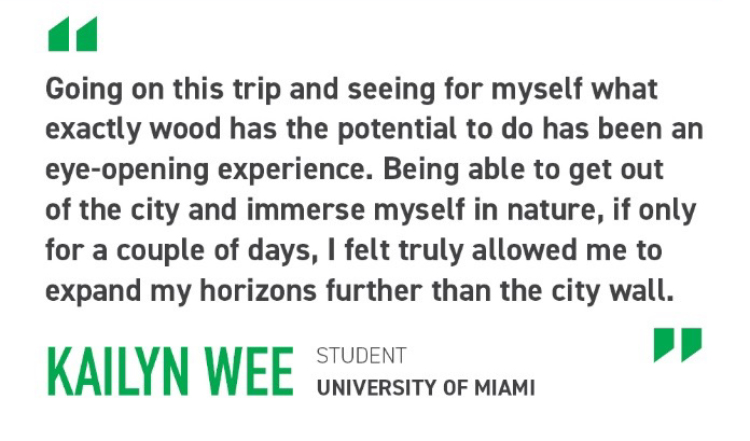 Recognizing the need to equip future architects with a deeper understanding of sustainable materials, SFI invests in hands-on learning opportunities that bridge the gap between education and real-world experience. Through our recent partnership with Florida A&M University (FAMU) and the University of Miami School of Architecture, we’re expanding access for students—including those from underserved communities—to explore the full lifecycle of sustainable building materials.
Recognizing the need to equip future architects with a deeper understanding of sustainable materials, SFI invests in hands-on learning opportunities that bridge the gap between education and real-world experience. Through our recent partnership with Florida A&M University (FAMU) and the University of Miami School of Architecture, we’re expanding access for students—including those from underserved communities—to explore the full lifecycle of sustainable building materials.
“Into The Woods: A Carbon Story,” in partnership with FAMU and the University of Miami School of Architecture’s LU Lab, addresses this gap by providing students with hands-on experiential learning opportunities in resource management and sustainable forestry. Through this partnership, students expanded their learning beyond a traditional classroom setting to see various parts of the forest product journey. From where it all starts in the forest, to timber harvesting and wood products manufacturing, students had the opportunity to witness firsthand how SFI-certified building products are produced and explore the origin of forest-based construction materials. Bridging the gap between theory and practice, the project allowed students to better understand the deep connection between forests and buildings, as well as make better-informed decisions as future architects.
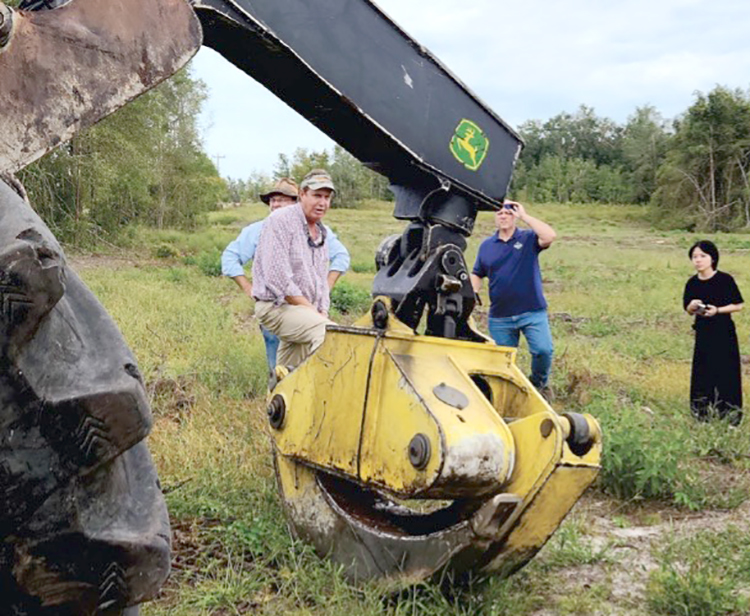
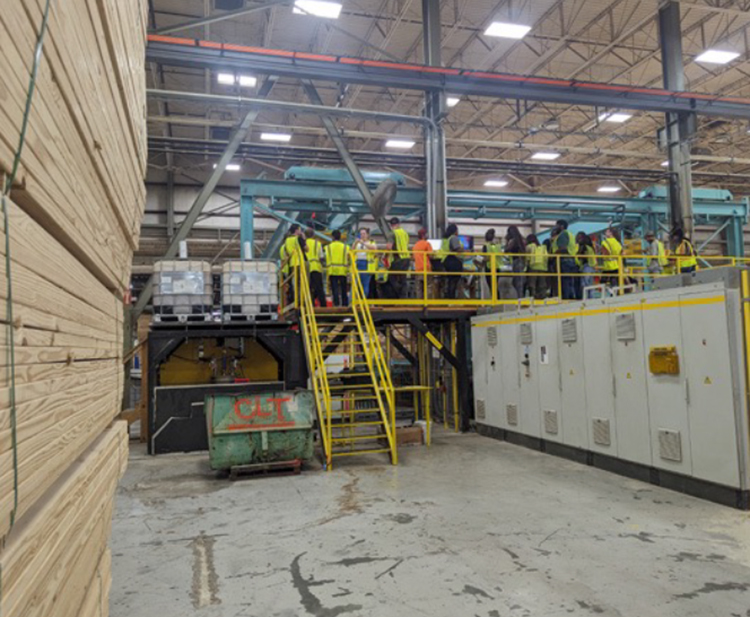
Empowering Through Experiential Learning
“Into The Woods: A Carbon Story” was a two-part project comprised of a series of immersive tours and a symposium focusing on sustainable forestry and timber production. Through these tours, architecture students from FAMU and the University of Miami School of Architecture learned about the practical aspects of timber production and manufacturing. The immersive tours were designed to give students hands-on experience in various phases of timber production, including:
- Forest exploration at the University of Florida’s Austin Carey Forest,
- Visiting an active logging site in High Springs, Florida,
- Touring a sawmill at REX Lumber, and
- Seeing mass timber and Cross-Laminated Timber (CLT) manufacturing facility at SmartLAM.
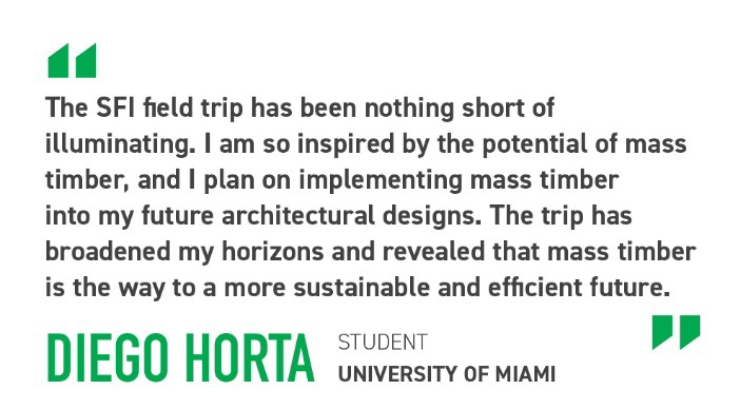 In addition to the tours, this project also included a symposium, bringing together students, faculty, and professionals across various fields. Students were offered a unique opportunity to hear directly from experts, ask questions, participate in discussions about sustainable practices, and deepen their understanding of the broader implications of architecture.
In addition to the tours, this project also included a symposium, bringing together students, faculty, and professionals across various fields. Students were offered a unique opportunity to hear directly from experts, ask questions, participate in discussions about sustainable practices, and deepen their understanding of the broader implications of architecture.
FAMU is the only public Historically Black College and University (HBCU) in Florida, and together with the University of Miami School of Architecture’s LU Lab, is committed to expanding opportunities for a greater representation of student backgrounds in the architecture and design fields. By partnering with these institutions, SFI is supporting a shared goal of advancing sustainability education, while ensuring that students from historically underrepresented backgrounds gain the knowledge and experience needed to lead in the growing green building sector.
By making learning opportunities accessible to youth from traditionally underrepresented communities, SFI was able to provide a crucial educational opportunity to prepare them for the workforce—the ability to see the forest sector firsthand. Experiences like this provide a valuable supplement to traditional classroom learning, creating real-life connections to subject matter that help students better understand the connections and how it relates to their future careers.
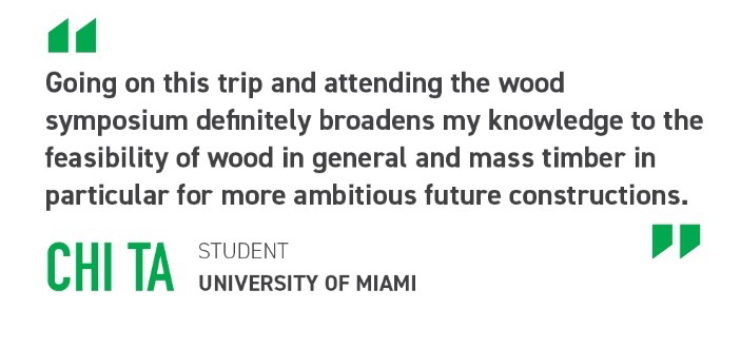 Forest Sector Support for Underrepresented Students
Forest Sector Support for Underrepresented Students
By investing in the success of their students, FAMU and the University of Miami School of Architecture’s LU Lab are investing in the future of architecture and sustainable construction. Providing students with the resources and learning opportunities needed for success ensures that our future workforce is both skilled and knowledgeable, as well as more representative of the many communities that value and benefit from forests. In fields like architecture, where sustainable practices are at the forefront of innovation and opportunity, it is increasingly important to invest in future leaders who bring a wide range of experiences and education to the table.
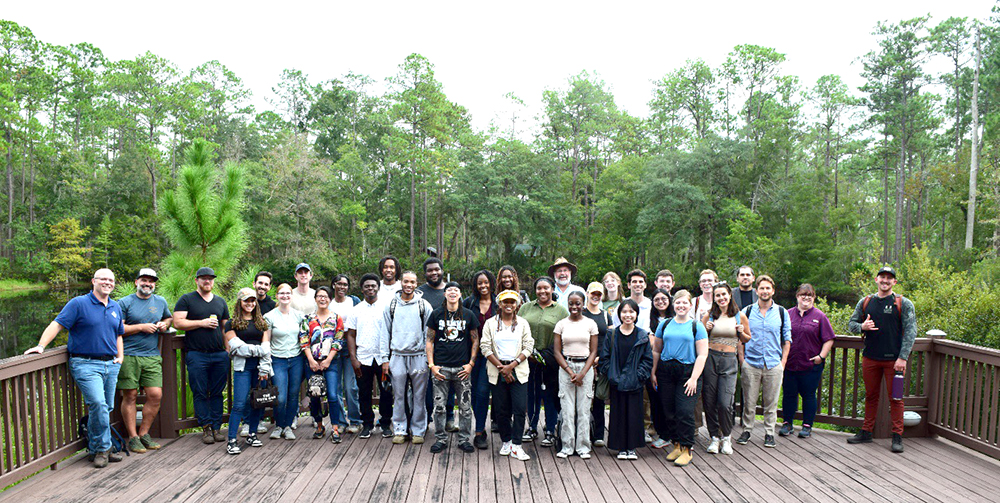
Projects like these promote sustainable practices, and drive positive change, underscoring the key role of education in shaping the future of architecture and building construction. These students will now carry the knowledge of mass timber and forest-building products into the workforce as future green building leaders.
Aligned with 2025-2030 Strategic Direction “theory of change” outcomes to advance workforce development, SFI offers funding support for forest-focused collaborative education and community-focused projects. To learn more, visit forests.org/communitygrants.
